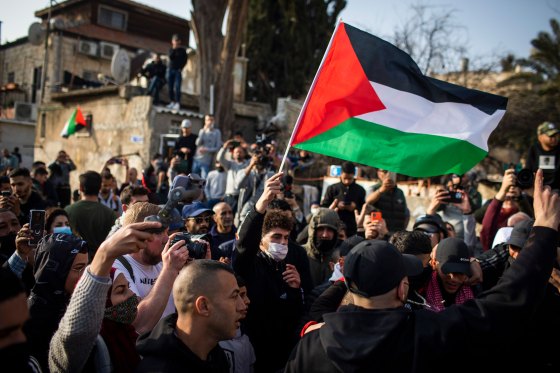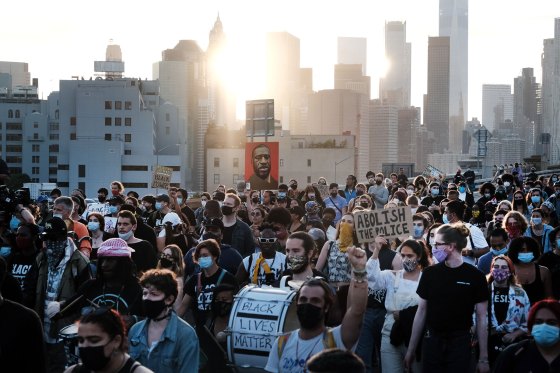Pro-Palestine activists have a long history of experiencing smear attacks targeting their places of employment or study. When Hadi Nasrallah tweeted a video of protestors confronting Israeli Ambassador Tzipi Hotovely after a late 2021 speaking engagement, he attracted the attention of David Collier. Collier has a large following, describes himself as a journalist and anti-semitism researcher, and has targeted supporters of Palestine and conflated critiques of Israel with anti-semitism in the past. Collier, who refers to Nasrallah as an “extremist,” began sharing personal images from Nasrallah’s Facebook account. Nasrallah reported these tweets and in response, Twitter locked Collier out of his account until he deleted the tweets that violated Twitter’s rules on sharing private media.
[time-brightcove not-tgx=”true”]
“Twitter is vital for Palestinian activists as it allows them to speak about their oppression in their own words, with a less likely chance of being censored like on other social media platforms,” says Farah Koutteineh, the Head of Public Relations at the Palestinian Return Centre, which focuses on the issue of Palestinian refugees.
From the Arab Spring, to the 2020 racial justice uprisings in the US, to worker-led boycotts in South Africa, and Gazans documenting the toll of Israeli attacks, Twitter has played a vital role for social justice movements across the world. When comparing content moderation approaches across platforms, Twitter sets a high standard with its enforcement of community guidelines. Activists have noted Twitter’s enforcement of community guidelines, which generally keep them safer from harassment than they feel on other platforms. Twitter goes farther than other social media outlets, and has banned users who violate its terms. (Famously, Donald Trump was banned from the platform for inciting violence during the Jan. 6, 2021, attack on the capitol.) Now that Elon Musk has a deal to buy the platform, organizers who use it—especially those from marginalized groups—are unsure what to expect. Musk has been a vocal critic of both the guidelines and the Twitter executives who enforce them and vowed to uphold freedom of expression. In a TED interview in April, he said he’s more in favor of temporary punishments for violations rather than permanent bans.
Roy Yellin, the public outreach manager of B’tselem, says that Twitter and social media coverage have shifted understandings of Israeli attacks in Gaza by “reversing the narrative that accompanied previous Israeli operations that Hamas was shooting rockets and Israel was retaliating to that” and instead reflecting the stance of human rights organizations that accuse Israel of apartheid.

Tinovimbanashe Gwenyaya, a former trade unionist in South Africa, has also seen the power of Twitter first hand. When workers at his union went on strike and then launched a boycott against the company, they turned to Twitter to raise awareness among South African customers while the company hired replacement workers. Prior to that, as a university student in South Africa he helped organize students campaigning against the Robert Mugabe regime in Zimbabwe, and Twitter helped spread the word about their marches and solidarity campaigns. “Twitter has played an important role in mobilizing people in historic ways,” says Gwenyaya, “where the marginalized can express their opinions freely against oppression, exploitation, dictatorships, regimes that seek to suppress free speech.” Gwenyaya argues that Musk’s “right-wing understanding of free speech” places that at risk.
Although many groups have found the platform useful and safe enough for organizing, they’ve still experienced harassment on it. Koutteineh fears the racist and Islamophobic harassment, death threats and defamation campaigns activists already face on the platform will increase under Musk’s leadership.
Labor activists, who have also faced harassment and defamation campaigns online when they organize, echo these concerns, pointing to Musk’s anti-union actions at his other company, Tesla, that earned him censure from the National Labor Relations Board. “How will Elon Musk respond to tweets against Tesla’s working conditions or environmental pollution? Will he tolerate tweets criticizing him?” says Gahyun Lee who was the first woman president of the Arbeit workers union in South Korea working with minimum wage and part-time workers. Musk has a record of going after critics both inside and outside of Tesla, but has tweeted that he hopes his critics remain on Twitter.
“Twitter under Elon Musk would make an already deadly Twitter even more lethal for our communities and democracies across South Asia,” says Thenmozhi Soundararajan, executive director of Equality Labs, which organizes with South Asian religious and cultural minorities for an end to caste apartheid. Religious and caste-oppressed minorities in India face intense vitriol online including smear campaigns, harassment, disinformation, trolling, threats of rape, violence to both themselves and their loved ones. she says. Twitter did not respond to a request for comment.
Musk has clarified that his commitment to free speech refers to that which is defined by governments which captures the will of the people, and India also demonstrates the limitations of this approach. Under a Hindu nationalist government, hate speech and violence against Muslims spreads quickly online and offline. “This kind of complete trust of government is ridiculous,” says Yellin, of B’tselem, “We know governments can be the best protectors of human rights and the most dangerous violators of human rights.”
Musk has also proposed eliminating anonymous profiles. Across the United States during the Black Lives Matter protests of 2020 and prior, anonymous accounts have played a major role in coordinating public actions. “What an enforced real-name policy means is that Twitter will not facilitate the organizing efforts of those in struggle against racialized police violence,” says Sarah Hamid, Campaign Lead at the Carceral Tech Resistance Network which supports abolitionist organizing campaigns.

While Twitter enables communities to build connections and unite during protests, such connections also carry risks, regardless of who owns the company. As networks are built on a public website, they are subject to the surveillance of companies like Dataminr who have been accused of racially profiling individuals when identifying potential “gang members” or “threats” for local police departments. Dataminr did not respond to a request for comment.
Katrina, a member of the Black Liberation Collective in Vermont who declined to share her last name, did not wish to speculate on what Musk will do, but doubts it will favor grassroots organizers like herself. “Ultimately he’ll implement whatever he wants to do in a way that will serve him, and as a poor, disabled Black fat woman, there’s a recognition I have that it could be anything in any given moment.”
The uncertainty around Twitter’s future has created an opportunity for organizers to reassess their relationship with the platform. Movements for social justice predate social media and successful organizers are profoundly creative. “This work is cobbled together from hundreds of experiments, and our tactics have to evolve and shift continuously,” says Hamid, “Our work doesn’t stop because of Elon Musk’s Twitter — we just move on and find other ways to activate, coordinate, and mobilize.”



0 Comments